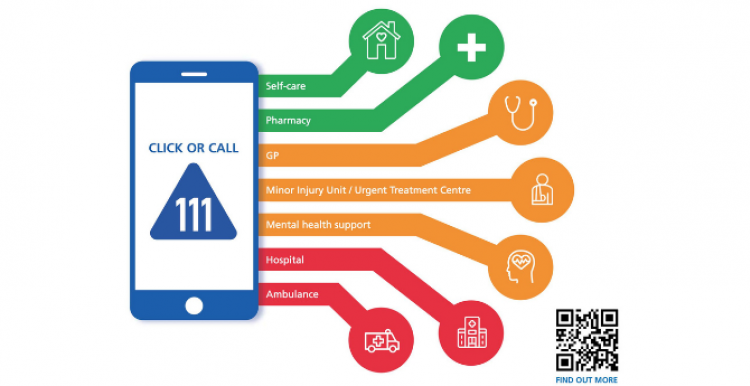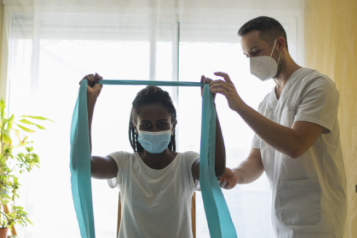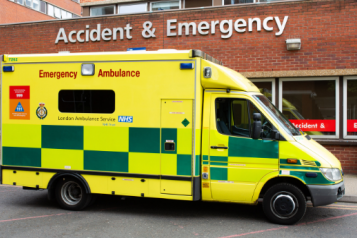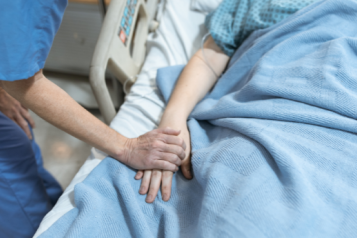Local NHS renews campaign to encourage people with non-life-threatening medical conditions to call 111 first

Many of our local health services, including A&E departments, are under a great amount of pressure. Calling NHS 111 when you have an urgent, but not life-threatening medical problem will help you get the care you need without unnecessary and lengthy waiting times.
111 in the Bristol, North Somerset and South Gloucestershire area has clinical staff, including nurses, doctors, and pharmacists, who can provide real-time medical advice over the phone if needed.
When you contact 111, the service will help you right away. If needed, a healthcare professional will call you back. Depending on your needs, 111 can also direct you to local urgent treatment centres/minor injury units, GPs, pharmacies or other local services. For serious, life-threatening emergencies, you should continue to dial 999.
They can also tell you where to get help for your symptoms, how to find general health information and where to get emergency supplies of your prescribed medicines.
Will I get a call back?
Based on your symptoms, NHS 111 may decide you need a call back from another medical professional. You will be told if this is the case, and once you have been told you will receive a call back, you only need to call NHS 111 again if your symptoms change or you feel unwell.
Sometimes, it's not possible to answer the phone. A nurse will try and call you up to 3 times. After the third time, they'll leave a message to say they tried to contact you, but you won't be able to call them back.
If you miss all three calls, you will have to start your assessment again. Call 111 for children under 5. For anyone 5 or over, use 111 online or call 111.
Using NHS 111
NHS 111 is available online at 111.nhs.uk or you can call 111 for free, 24 hours a day.
If you have hearing loss, are Deaf, or have difficulty communicating you can also access NHS 111 by textphone on 18001 111. British Sign Language users can use the NHS 111 BSL interpreter service.
To find out more about 111 and get information in alternative formats including BSL, easy read, large print and audio, visit nhs.uk/111.
Which service is right for me?
Visit the Healthier Together website for more information.
- Self-care is best for very minor ailments such as sore throats and upset stomachs. Help yourself by keeping a well-stocked home medicine cabinet with essentials such as paracetamol and a first aid kit.
- Pharmacies can help with common problems like coughs and colds, as well as offering emergency contraception and emergency prescriptions. They can also tell you if you need to see a GP.
- GPs are there to help with an illness or injury that won’t go away. Many GPs now offer telephone or online consultations, which can be easier than attending in person. Outside normal opening hours, contact NHS 111.
- NHS 111 is the 24-hour service for when you think you need help right away but it’s not a life-threatening emergency. They will assess your needs, provide advice over the phone, and if necessary refer you for an urgent face-to-face consultation in the best service for your needs.
- The Minor Injury Units in Yate and Clevedon provide care for non-life threatening injuries like broken bones, minor burns, sprains, cuts and lacerations, splinters, minor eye injuries and more. They do not treat illness, chest pain, shortness of breath, or stroke or medical issues. Contact NHS 111 for guidance on your nearest service.
- The Urgent Treatment Centre in South Bristol provides the same service as a Minor Injury Unit with the addition of minor illnesses. It doesn’t treat chest pain, shortness of breath, stroke or longstanding medical issues. Contact NHS 111 for guidance on your nearest service.
- A&E and 999 are for life-threatening emergencies like a suspected stroke, loss of consciousness or a serious injury. If you go to a local A&E with a non life-threatening injury or illness, staff will assess you and may refer you to a more suitable service.
The NHS has published two new posters to encourage people to call 111 first. You can download the posters below.
Downloads
Have you called 111 recently? If you found it helpful or think it could be improved, share your feedback with us by clicking the pink 'Talk to us' button below.


